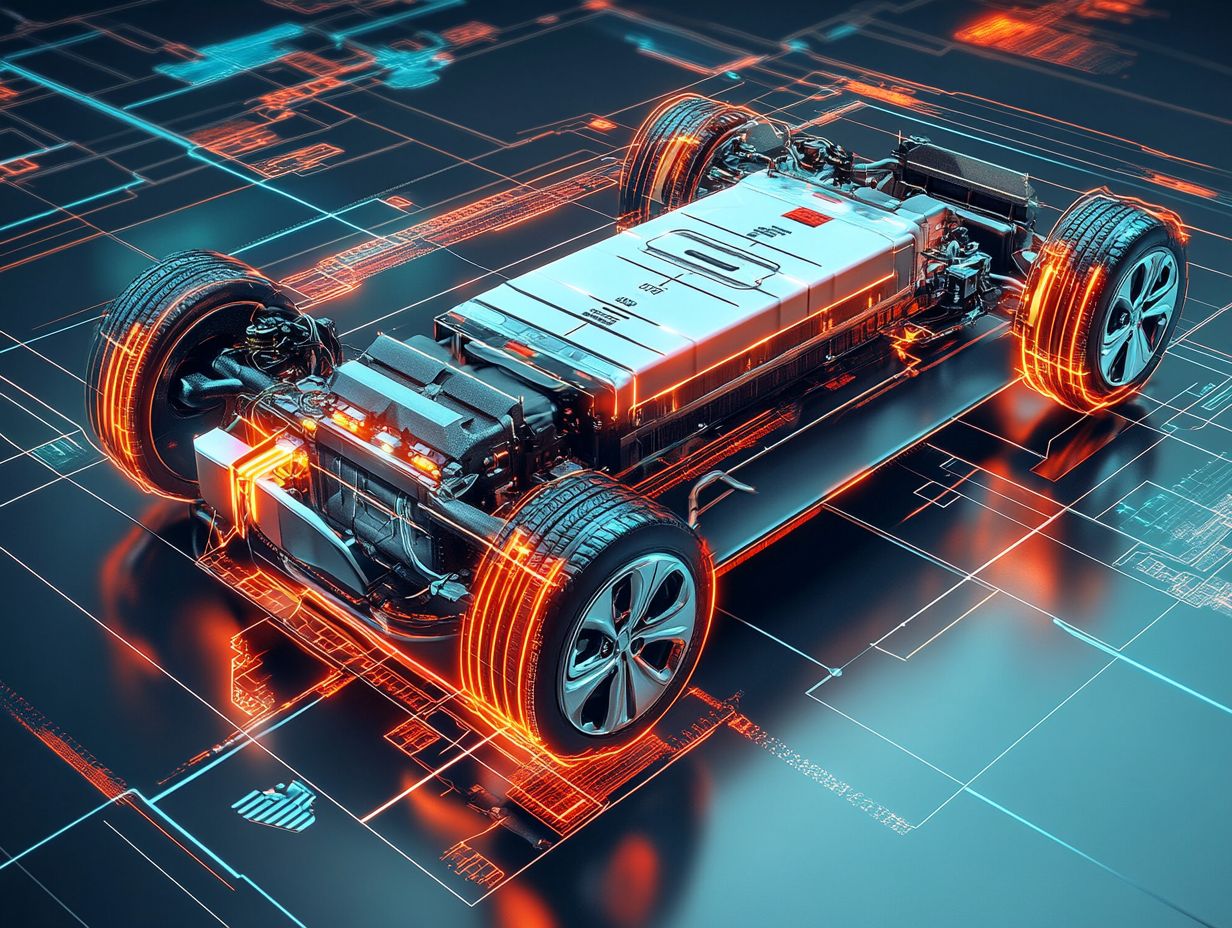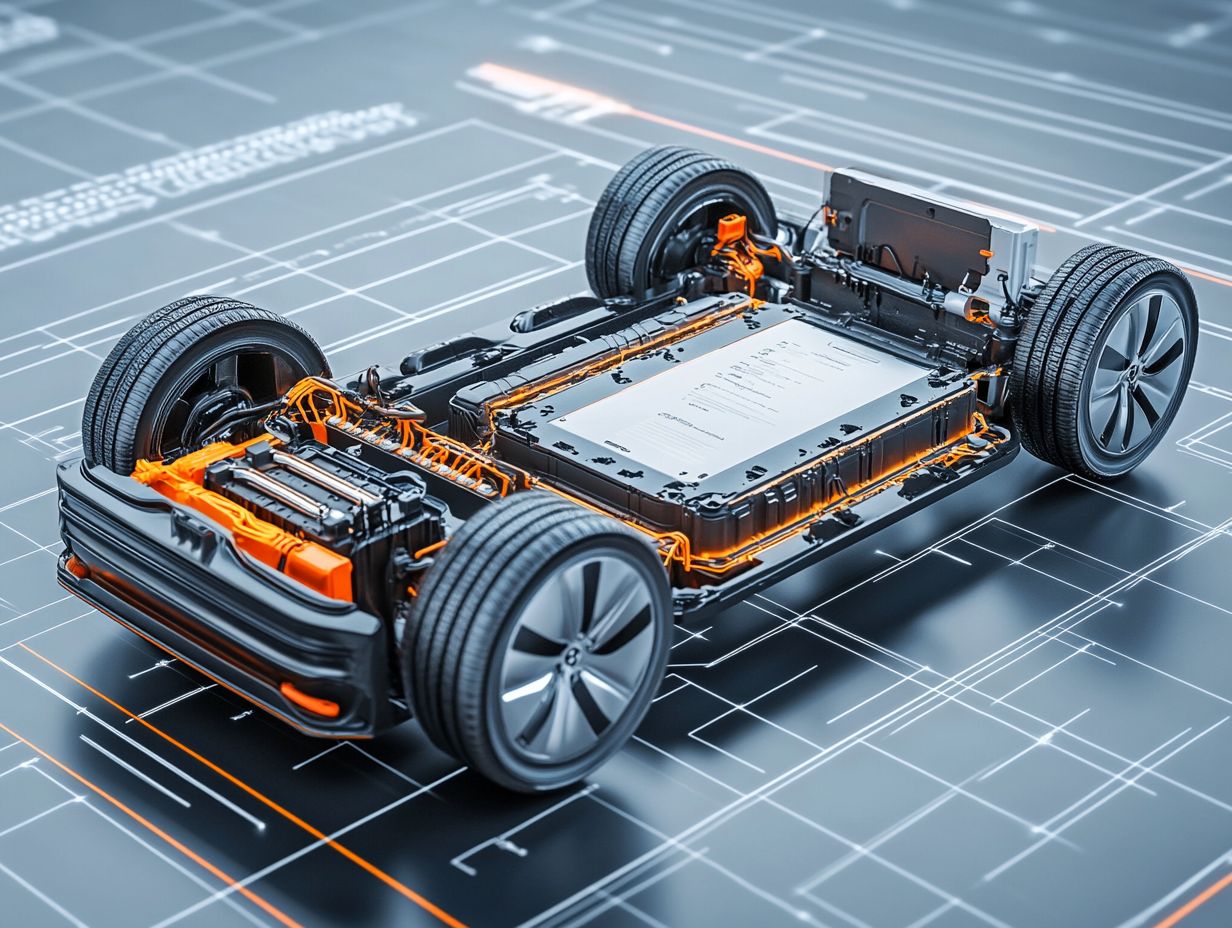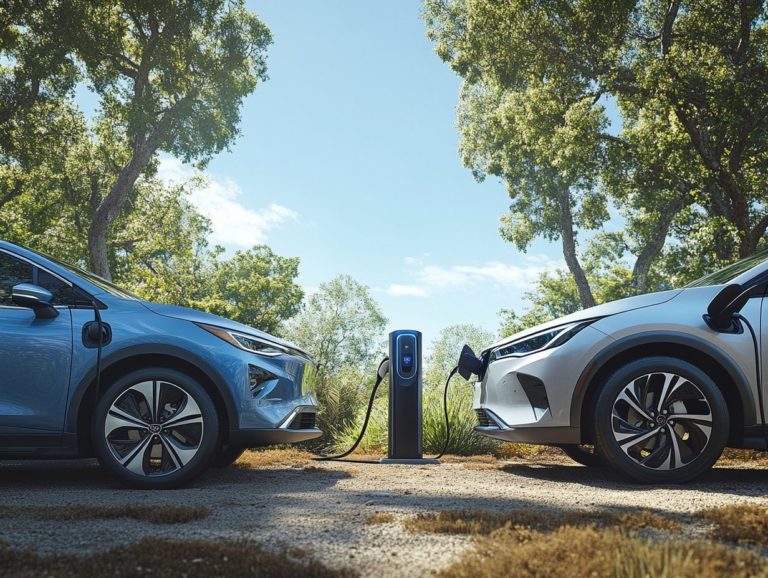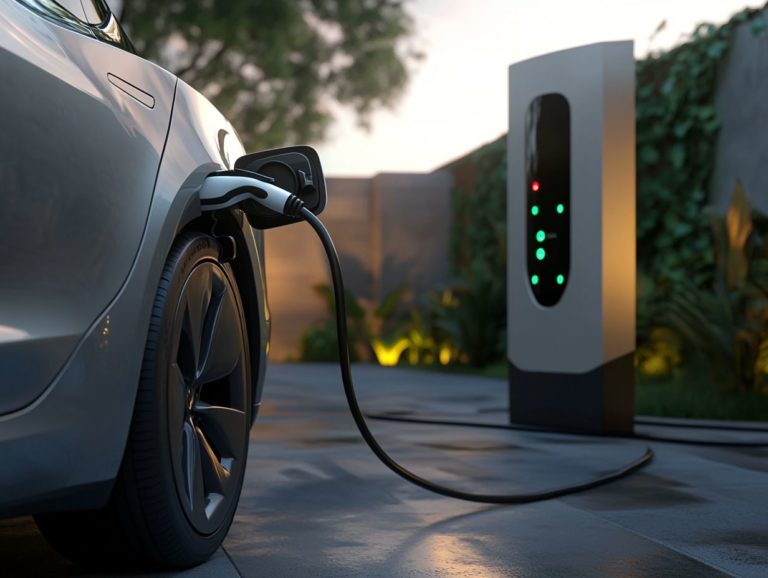49. understanding the lifespan of ev batteries
As electric vehicles (EVs) gain traction, understanding the lifespan of their batteries is essential for current and prospective owners.
This guide delves into the intricacies of EV batteries. You ll discover useful tips that enhance your electric driving experience. Learn to recognize the signs of battery deterioration and uncover vital maintenance tips to help extend their lifespan.
We ll address when and how to replace batteries, along with exciting advancements on the horizon. Whether you re an EV enthusiast or just starting your electric driving journey, this guide offers valuable insights for a smoother ride ahead.
Contents
- Key Takeaways:
- Factors Affecting EV Battery Lifespan
- Signs of Battery Deterioration
- Extending the Lifespan of EV Batteries
- Replacing EV Batteries
- When and How to Replace Batteries
- The Future of EV Batteries
- Frequently Asked Questions
- Curious about EV batteries? What is the average lifespan of an EV battery?
- What factors can affect the lifespan of an EV battery?
- Can an EV battery be replaced or repaired?
- Do EV batteries lose their capacity over time?
- How can I prolong the lifespan of my EV battery?
- Are there any warranties for EV batteries?
Key Takeaways:
- EV batteries are essential for electric vehicles.
- Battery lifespan is affected by usage and environment.
- Watch for signs of deterioration, like reduced range.
- Proper maintenance extends battery life.
- Timing and options are key when replacing batteries.

What are EV Batteries?
EV batteries are the beating heart of electric vehicles (EVs) like the Nissan LEAF, Chevrolet Bolt, and Tesla Model S. These advanced lithium-ion batteries deliver impressive energy storage and performance.
They provide the energy density and capacity necessary for traction, allowing you to embrace electric mobility while enjoying optimal vehicle range and efficiency. Various types of EV batteries, such as nickel-metal hydride and solid-state options, play crucial roles in defining the performance and application of different electric vehicle models.
Lithium-ion batteries are highly sought after for their exceptional energy density, enabling longer driving ranges. Solid-state batteries are coming soon, promising enhanced safety and faster charging experiences.
As battery technology continues to advance, the automotive industry is focused on boosting energy capacity, enhancing thermal management, and minimizing charging times. These improvements are essential for elevating your user experience.
The evolution of these technologies will undoubtedly impact sustainability and efficiency in transportation, catalyzing further innovation throughout the sector.
Factors Affecting EV Battery Lifespan
Several factors play a crucial role in determining the lifespan of your EV battery. Your charging practices, the environmental conditions it endures, and the sophistication of battery management systems all influence its performance, making it important to understand what is the lifespan of an EV battery.
Environmental Factors
Environmental factors, such as extreme temperatures, can significantly impact the performance and longevity of your EV’s battery. When temperatures soar above 40 degrees Celsius or dip below 0 degrees Celsius, the effects become more pronounced, accelerating chemical reactions within lithium-ion batteries.
Excessive heat can lead to electrolyte breakdown, while icy conditions can impede the battery’s ability to discharge effectively, diminishing its capacity and lifespan.
To address these issues, manufacturers use thermal management systems to regulate battery temperatures, ensuring they function within optimal ranges.
As an owner, you can take proactive steps by parking your vehicle in shaded areas or using insulation materials to protect the battery from drastic temperature fluctuations. Taking these steps will extend your battery s life significantly.
Usage and Charging Patterns
Usage and charging patterns are pivotal in determining the overall health and efficiency of your EV batteries. They affect how quickly your battery drains and how well it retains capacity over time.
These factors become even more significant when you compare fast charging and regular charging methods. While fast charging may offer the allure of convenience, it often generates excess heat, which can speed up battery cell degradation. Regular charging, on the other hand, typically operates at moderate temperatures, making it gentler on your battery.
Act now to keep your battery performing at its best! It s crucial to monitor battery health regularly. This proactive approach can unveil potential issues before they escalate.
By implementing best practices, such as avoiding extreme temperatures and charging only to 80% capacity, you can extend battery life and enhance efficiency. This ensures that your electric vehicle remains reliable for the long haul.
Signs of Battery Deterioration

Recognizing the signs of battery deterioration in your EV is crucial for preserving its performance.
Common indicators to watch for include:
- A noticeable reduction in battery capacity
- Unexpected drainage
- A rise in reported replacements by owners
Staying vigilant about these signs helps ensure your vehicle remains in top condition.
Common Indicators
Look for common signs of battery deterioration, such as a noticeable drop in battery capacity. This can significantly affect your vehicle’s performance and may lead to warranty replacements if repair options aren t available.
You might also notice reduced charging efficiency and increased self-drain rates, which indicate a decline in battery health. These factors directly impact the distance your vehicle can travel on a single charge, affecting your daily usability and overall driving satisfaction.
Recognizing these indicators is essential. They signal when your battery needs attention and play a vital role in navigating warranty terms.
Understanding your warranty is crucial. It clarifies replacement procedures and options, ensuring minimal disruption in your driving experience.
Extending the Lifespan of EV Batteries
You can make your EV batteries last longer with regular care. This includes using proper charging technologies and consistently monitoring battery health.
By taking these proactive steps, you can ensure that your investment performs optimally for years to come.
Maintenance Tips and Best Practices
To achieve optimal battery longevity, you should adopt maintenance tips, such as regular battery monitoring. Following recommended charging practices keeps your battery health in top shape.
Incorporating routine checks into your schedule allows for early detection of potential issues affecting performance. Understanding the nuances of charging, including when to plug in and how to avoid complete discharges, is critical for preserving battery capacity.
It’s wise to recognize signs of deterioration, such as reduced range or unusual charging times. These may indicate that a more thorough evaluation is necessary. By prioritizing these proactive measures, you can significantly extend the life of your electric vehicle s battery and enhance your overall driving experience.
Replacing EV Batteries
Replacing EV batteries can be quite a complex endeavor, often influenced by factors such as warranty coverage, potential manufacturer defects, and the specific procedures set forth by different EV brands.
Start monitoring your EV battery today for a smoother ride tomorrow!
When and How to Replace Batteries

Knowing when and how to replace batteries in your electric vehicle (EV) is crucial for maintaining optimal performance. Look for clear signs that your battery needs replacing, while also keeping an eye on warranty options to save you money.
Check your battery’s health by paying attention to its range, charging speed, and any unusual warning lights. If you notice a decrease in range or slower charging times, it s likely a sign that the battery is losing capacity. Assess the situation promptly.
Most manufacturers offer warranties that cover battery replacements for a specific duration or mileage, which can significantly lessen your out-of-pocket expenses when it’s time for a change. If you spot signs of wear, consult your warranty policy to verify what is covered.
Once you ve decided to replace the battery, sourcing a suitable replacement is key. Conduct thorough research on reputable suppliers. Whether you have the installation done by professionals or take on a DIY project, follow the guidelines in your vehicle s manual to ensure safety and functionality.
The Future of EV Batteries
The future of EV batteries holds remarkable potential, with exciting advancements and innovations on the horizon.
As you explore this landscape, you’ll notice a strong emphasis on sustainability, particularly through battery recycling initiatives. Developing strategies to enhance efficiency and performance is crucial and will shape the evolution of the automotive industry.
Advancements and Innovations
Recent advancements in battery technology, particularly with rechargeable batteries known as lithium-ion batteries, have significantly enhanced energy density (the amount of energy a battery can store) and performance, setting the stage for a transformative shift in the automotive industry.
These innovations include breakthroughs in lithium-ion chemistry that allow for faster charging times and longer lifespans, effectively addressing the crucial concerns regarding electric vehicle (EV) usability.
With increased energy density, manufacturers can now create batteries that store more energy without increasing size, leading to vehicles that offer extended driving ranges.
Efficiency improvements further minimize energy loss during charging and discharging cycles, enhancing overall vehicle performance.
As these advancements continue to evolve, they promise to boost consumer confidence in electric vehicles and reshape the market landscape, making sustainable transport more accessible to everyone.
Frequently Asked Questions
Curious about EV batteries? What is the average lifespan of an EV battery?
The average lifespan of an EV battery is around 8-10 years, or approximately 100,000 miles.
What factors can affect the lifespan of an EV battery?

Factors such as temperature, frequency of charging, and driving habits can all impact the lifespan of an EV battery, making it important to understand the maintenance needs of EVs.
Can an EV battery be replaced or repaired?
Yes, an EV battery can be replaced or repaired, depending on the specific model and manufacturer. However, it can be a costly process.
Do EV batteries lose their capacity over time?
Yes, like any other type of battery, EV batteries do lose their capacity over time. This process is known as battery degradation.
How can I prolong the lifespan of my EV battery?
You can prolong the lifespan of your EV battery by avoiding extreme temperatures, limiting frequent fast charging, and practicing efficient driving habits.
Are there any warranties for EV batteries?
Yes, most EV manufacturers offer warranties for their batteries, typically covering at least 8 years or 100,000 miles. Some manufacturers may offer even longer warranties.
Ready to learn more? Explore our resources on EV battery care!





